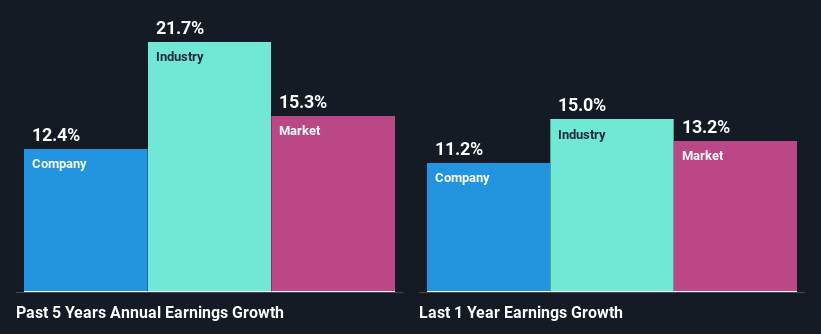- Saudi Arabia
- /
- Real Estate
- /
- SASE:4090
Taiba Investment Company's (TADAWUL:4090) Financials Are Too Obscure To Link With Current Share Price Momentum: What's In Store For the Stock?

Taiba Investment (TADAWUL:4090) has had a great run on the share market with its stock up by a significant 17% over the last month. However, we decided to pay attention to the company's fundamentals which don't appear to give a clear sign about the company's financial health. In this article, we decided to focus on Taiba Investment's ROE.
Return on equity or ROE is an important factor to be considered by a shareholder because it tells them how effectively their capital is being reinvested. Simply put, it is used to assess the profitability of a company in relation to its equity capital.
Check out our latest analysis for Taiba Investment
How Do You Calculate Return On Equity?
Return on equity can be calculated by using the formula:
Return on Equity = Net Profit (from continuing operations) ÷ Shareholders' Equity
So, based on the above formula, the ROE for Taiba Investment is:
3.1% = ر.س210m ÷ ر.س6.8b (Based on the trailing twelve months to September 2024).
The 'return' is the amount earned after tax over the last twelve months. One way to conceptualize this is that for each SAR1 of shareholders' capital it has, the company made SAR0.03 in profit.
Why Is ROE Important For Earnings Growth?
We have already established that ROE serves as an efficient profit-generating gauge for a company's future earnings. Based on how much of its profits the company chooses to reinvest or "retain", we are then able to evaluate a company's future ability to generate profits. Assuming all else is equal, companies that have both a higher return on equity and higher profit retention are usually the ones that have a higher growth rate when compared to companies that don't have the same features.
Taiba Investment's Earnings Growth And 3.1% ROE
It is quite clear that Taiba Investment's ROE is rather low. Even compared to the average industry ROE of 11%, the company's ROE is quite dismal. Although, we can see that Taiba Investment saw a modest net income growth of 12% over the past five years. Therefore, the growth in earnings could probably have been caused by other variables. For example, it is possible that the company's management has made some good strategic decisions, or that the company has a low payout ratio.
Next, on comparing with the industry net income growth, we found that Taiba Investment's reported growth was lower than the industry growth of 22% over the last few years, which is not something we like to see.

Earnings growth is a huge factor in stock valuation. It’s important for an investor to know whether the market has priced in the company's expected earnings growth (or decline). This then helps them determine if the stock is placed for a bright or bleak future. Has the market priced in the future outlook for 4090? You can find out in our latest intrinsic value infographic research report
Is Taiba Investment Making Efficient Use Of Its Profits?
While Taiba Investment has a three-year median payout ratio of 75% (which means it retains 25% of profits), the company has still seen a fair bit of earnings growth in the past, meaning that its high payout ratio hasn't hampered its ability to grow.
Moreover, Taiba Investment is determined to keep sharing its profits with shareholders which we infer from its long history of paying a dividend for at least ten years.
Summary
Overall, we have mixed feelings about Taiba Investment. While no doubt its earnings growth is pretty respectable, the low profit retention could mean that the company's earnings growth could have been higher, had it been paying reinvesting a higher portion of its profits. An improvement in its ROE could also help future earnings growth. So far, we've only made a quick discussion around the company's earnings growth. To gain further insights into Taiba Investment's past profit growth, check out this visualization of past earnings, revenue and cash flows.
Valuation is complex, but we're here to simplify it.
Discover if Taiba Investment might be undervalued or overvalued with our detailed analysis, featuring fair value estimates, potential risks, dividends, insider trades, and its financial condition.
Access Free AnalysisHave feedback on this article? Concerned about the content? Get in touch with us directly. Alternatively, email editorial-team (at) simplywallst.com.
This article by Simply Wall St is general in nature. We provide commentary based on historical data and analyst forecasts only using an unbiased methodology and our articles are not intended to be financial advice. It does not constitute a recommendation to buy or sell any stock, and does not take account of your objectives, or your financial situation. We aim to bring you long-term focused analysis driven by fundamental data. Note that our analysis may not factor in the latest price-sensitive company announcements or qualitative material. Simply Wall St has no position in any stocks mentioned.
About SASE:4090
Taiba Investment
Invests in, buys, owns, develops, sells, leases, operates, maintains, markets, and manages real estate properties in the Kingdom of Saudi Arabia.
Mediocre balance sheet unattractive dividend payer.
Market Insights
Community Narratives




